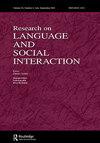共同的知识作为敌对动作的解释:希伯来语ki“因为”从句伴随着手掌向上张开的手势
IF 2.1
1区 文学
Q1 COMMUNICATION
引用次数: 1
摘要
摘要本研究通过探索语法-身体界面,考察了希伯来语因果从句在回应性否定动作中以连词ki“因为”开头的使用情况。我们发现,在这种环境中,ki子句倾向于传达吸引参与者共享知识的信息,并伴随着手掌向上张开的手势(PUOH)。我们认为,在这种背景下,PUOH构成了一个具体的认识立场标记,其作用是将以ki开头的叙述呈现为基于共享知识,追求主体间性和共享视角。对共享认知访问的提及意味着在账户提供的情况下,对非合作行为的解释是合理的,邀请共同参与者展示合作关系。因此,该研究验证了因果关系是一种社会构建的复杂结构,可能包括说话者对互动中完成的行为的认识立场,并为其相互关系提供了互动来源。数据为希伯来语本文章由计算机程序翻译,如有差异,请以英文原文为准。
Shared Knowledge as an Account for Disaffiliative Moves: Hebrew ki ‘Because’-Clauses Accompanied by the Palm-Up Open-Hand Gesture
ABSTRACT Exploring the grammar–body interface, the present study examines employment of Hebrew causal clauses prefaced by the conjunction ki “because” in responsive disaffiliative moves. We show that in such environments, ki-clauses tend to convey information that appeals to the participants’ shared knowledge and to be accompanied by the Palm Up Open Hand gesture (PUOH). We argue that the PUOH in such contexts constitutes an embodied epistemic stance marker functioning to present the account prefaced by ki as based on shared knowledge, in pursuit of intersubjectivity and a shared perspective. The reference to shared epistemic access implies an interpretation of the disaffiliative move as reasonable under the circumstances provided by the account, inviting co-participants to display affiliation. The study thus validates that causality is a socially constructed, complex configuration that may include the speaker’s epistemic stance toward the actions accomplished in an interaction and suggests an interactional source for their interrelatedness. Data are in Hebrew
求助全文
通过发布文献求助,成功后即可免费获取论文全文。
去求助
来源期刊
CiteScore
7.30
自引率
7.40%
发文量
20
期刊介绍:
The journal publishes the highest quality empirical and theoretical research bearing on language as it is used in interaction. Researchers in communication, discourse analysis, conversation analysis, linguistic anthropology and ethnography are likely to be the most active contributors, but we welcome submission of articles from the broad range of interaction researchers. Published papers will normally involve the close analysis of naturally-occurring interaction. The journal is also open to theoretical essays, and to quantitative studies where these are tied closely to the results of naturalistic observation.

 求助内容:
求助内容: 应助结果提醒方式:
应助结果提醒方式:


